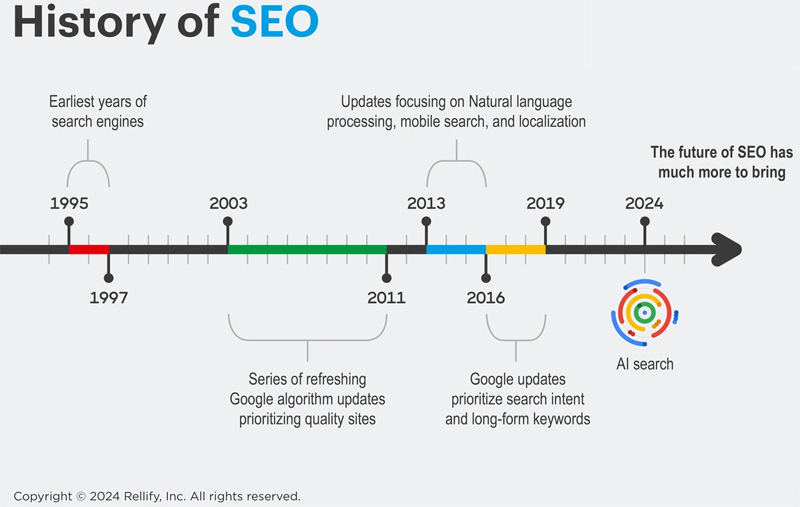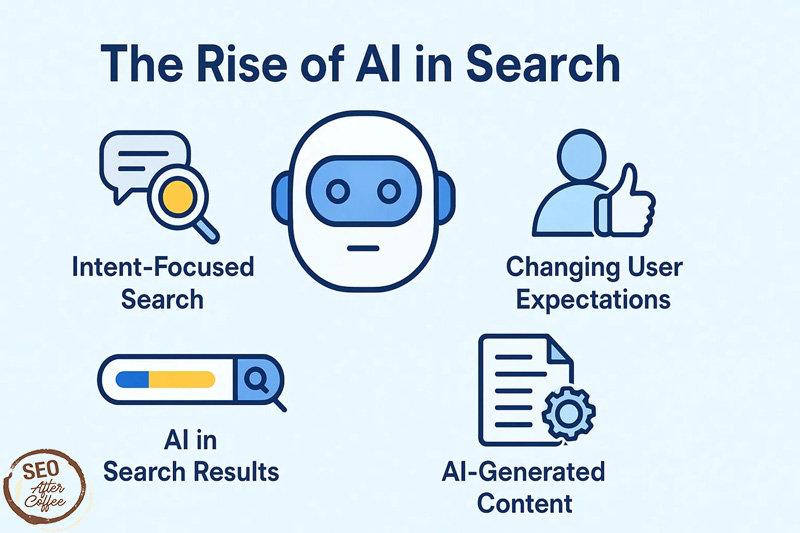AI-powered SEO with large language models is changing content optimization. ChatGPT accounts for approximately 10% of new Vercel sign-ups today, a significant increase from 1% six months ago. Search volume has reached record levels on Google, YouTube, Meta, and AI platforms like ChatGPT.
SEO helps optimize web content so that AI systems can understand and utilize it more effectively. SEO needs a complete rethink of old methods. Writers must create meaningful content that matches what users want, rather than stuff keywords everywhere. Google’s AI Overviews might cut clicks by 34.5% compared to regular searches without them.
Let’s explore what works for SEO in 2025. LLMs excel at finding long-tail keywords, and these neural networks pack over a billion parameters. Your content needs different optimization strategies to succeed in this AI-first world. We’ll show you the best SEO practices that work in 2025.

The evolution of SEO: From keywords to concepts
Search engine optimization has envolved over the past several years. Simple keyword matching has given way to a complex ecosystem. User intent and context now matter more than ever in this complete redefinition of how content connects with users’ changing needs.
Why traditional SEO is no longer enough
Old SEO tactics that once worked no longer deliver results in today’s digital world. Keyword stuffing belongs to the past – repeating keywords to boost rankings is no longer effective. Google makes it clear that keyword stuffing can hurt your site’s ranking.
Search engines have become smarter. Google’s algorithms now reward content that demonstrates a genuine understanding of the topic rather than relying solely on keyword matches. Recent studies show that all but one of these pages receive no traffic from Google, which highlights the futility of relying on outdated methods.
Keywords alone no longer matter – comprehensive topic coverage does. One expert puts it well: “The time when an SEO could do some magical stuff and suddenly a website would rank is very over”. SEO professionals must optimize for topics rather than specific keywords and create content that demonstrates their expertise.
How AI-first interfaces are reshaping discovery
AI-first interfaces add a new dimension to content discovery. ChatGPT now drives about 10% of new Vercel sign-ups, up from 1% six months ago. These numbers demonstrate why SEO strategies must adapt quickly to emerging discovery patterns.
AI interfaces differ from traditional search. They answer questions directly without sending users to websites. Entity-based SEO focuses on concepts and idea relationships rather than keywords. Search engines evaluate how effectively content delivers value within broader knowledge structures.
Modern algorithms look beyond matching terms. They study how ideas connect and check if the content truly understands the topic. Users now prefer LLMs over regular search engines when they need detailed explanations or personalized answers.
The rise of zero-click and conversational search
Zero-click searches have changed how users behave online. Searchers want to get answers directly on the page without needing to click links. A recent study, published in 2025 by researchers, shows that 27.2% of U.S. searches ended without clicks, up from 24.4% the previous year.
Zero-click results come in several forms:
- Featured snippets that provide immediate answers
- Knowledge panels displaying entity information
- AI Overviews synthesizing information from multiple sources
- Direct answer boxes for simple questions
Voice search has also grown rapidly. Approximately 28% of U.S. and UK consumers use voice assistants daily. Voice searches use complete sentences while typed searches stay brief. Someone might type “best coffee NYC” but ask their device, “Where can I find the best coffee shop in New York City?“.
You business needs to have content that answers specific questions naturaly. This approach enables them to succeed in both traditional and emerging search environments. The future belongs to those who adapt to these changes quickly.
What actually works in SEO today?

You just need a data-driven strategy, not theoretical concepts, to succeed in SEO. SEO experts have conducted extensive testing to reveal what works with large language models in 2025.
Owning a concept with depth and clarity
SEO works best when you focus on detailed concept coverage instead of keyword targeting. The quickest way to succeed is to deeply own one topic with authority and thoroughness rather than chasing 100 random keywords. Content clusters that interconnect around central themes make this possible.
Using Topic clusters has become a very powerful tool in SEO because AI systems favor domains that demonstrate in-depth, hosted knowledge in specific subject areas. A typical cluster strategy includes:
- Creating one detailed pillar page (e.g., “What is a virtual restaurant?”)
- Developing 5-10 supporting content pieces about related aspects
- Interlinking all content with descriptive anchor text
- Updating and expanding the topic ecosystem regularly
More importantly, content clusters show LLMs your brand’s genuine expertise. Kevin Indig’s research shows that modern LLM-based search prioritizes targeted, relevant content that explores multiple angles of the same topic over backlink quantity.
Publishing definitive, evidence-based content
LLMs favor content with clear, factual statements. Marie Haynes discovered that “fact-checkable snippets” significantly increase the likelihood of an LLM trusting and referencing your content. Adding verifiable data points, original research, and evidence turns your content into authoritative reference material.
This preference for evidence goes beyond citing statistics. Creating your data or conducting original research gives unique information that helps your content stand out. You can further enhance content trustworthiness by including methodology notes and linking to reputable sources.
What makes content truly authoritative? Research shows it’s a mix of expertise signals (through author credentials), original insights, and transparent sourcing. Your goal should be to share something new with the world, rather than rehashing existing information. One expert puts it well: “AI engines don’t cite boring rehashes. They’re too busy doing that job for us”.
Using consistent terminology and a clean structure
Structural clarity has become a crucial factor in SEO. Lily Ray’s testing showed that content with consistent heading levels (H2 followed by H3 and bullet points) had a 40% better chance of being rephrased by ChatGPT. The way you organize information matters as much as the information itself.
Your terminology also needs to remain consistent. Glen Gabe noticed that AI references become more reliable when brand details remain consistent across all digital properties. Consistently applies to all terminology throughout your content ecosystem, not just product names.
Your content should follow these structural best practices for optimal LLM understanding:
- Use a clear heading hierarchy (H1→H2→H3) with descriptive headings that match people’s questions
- Keep passive voice under 10% and use transition words in at least 30% of sentences
- Put the most important information first, like in Wikipedia articles
- Use schema markup to clarify concepts and help AI understand
These points show that successful SEO combines semantic clarity with structural precision. Content has a better chance of being retrieved and cited as an authority when it’s organized to match how language models process information.
Common mistakes and myths about SEO
Many marketers make critical mistakes with SEO that hurt their optimization efforts. You can save resources and improve results by learning these common pitfalls.
Overusing keywords or fluff content
Keyword stuffing remains one of the most stubborn yet harmful SEO practices. Modern LLMs now penalize content that forces keywords unnaturally into the text, although this tactic was effective in the past. Many marketers still try to cram keywords unnaturally, which results in:
- Poor user experience and higher bounce rates
- Reduced rankings and organic traffic
- Potential Google penalties for spam violations
Keyword overuse damages readability and discourages users from participating—even when it’s not deliberately manipulative. Users quickly leave when content feels repetitive or unnatural, which sends negative signals to search algorithms.
Relying solely on AI-generated text
AI tools have become valuable partners, but complete dependence on them creates significant risks. LLMs can’t verify content accuracy because they lack a proper understanding or knowledge. Human expertise plays a vital role in fact-checking and providing nuanced insights that AI cannot offer.
Google clearly warns against publishing unedited AI content just to manipulate search rankings. Unedited AI content comes with major issues:
- Potential factual errors or hallucinations
- Outdated information (ChatGPT’s knowledge cutoff, to name just one example)
- No unique view or brand voice
Ignoring technical SEO fundamentals
In the LLM era, Technical SEO has a significant and maybe even more than before. AI models can’t efficiently access and understand your content when you have poor crawlability, slow page speed, or missing structured data.
Your content becomes invisible to advanced systems when you neglect these technical foundations, regardless of its quality. Technical SEO works as the gateway for AI to access your digital assets.
Assuming LLMs understand like humans
The most significant mistake is assuming LLMs comprehend content in the same way humans do. These models analyze statistical patterns without truly understanding the meaning.
LLMs lack a knowledge base and are not up-to-the-minute. You’re not working with a thinking entity, but rather with a statistical analysis of internet text patterns, when you ask an LLM to think about something.
Clean structure and consistent terminology matter more than ever. LLMs process information differently than humans do. Your content organization should match how these models interpret data—using clear hierarchy, descriptive headings, and logical progression.
Balancing AI tools with human expertise
The sweet spot between AI capability and human judgment lies at the heart of successful LLM SEO strategies in 2025. This balance depends on knowing when each component delivers the best value.
When to use LLMs for content creation
LLMs excel at specific content-related tasks where speed is crucial. Organizations report that AI automation accounts for 44.1% of core SEO tasks, including content creation and keyword research. Teams save substantial time, with 17% of professionals cutting more than 10 hours weekly through AI-powered SEO tasks.
Tools like GPT-4 ultimately generate high-quality content quickly. SEO professionals can produce articles, blog posts, and product descriptions that search engines love. These tools excel at:
- Suggesting relevant keywords based on trends and user intent
- Creating a consistent structure across content pieces
- Scaling content production (75.4% of businesses report improved scalability)
- Analyzing competitor content to identify gaps
Why human editing and fact-checking are essential
Controlled tests consistently show that human-written content ranks better than machine-generated text in search results. Human oversight becomes crucial to ensure factual accuracy.
Research proves LLMs can’t replace human fact-checkers. Even rare mistakes could devastate today’s information ecosystem. AI-generated content without human review often misses the depth and authenticity needed to meet strategic goals.
The human touch in content creation brings unique, engaging qualities that resonate with users. Content stands out in competitive markets and builds trust with your audience.
Combining AI efficiency with editorial judgment
Innovative digital marketing strategies don’t compete AI against human creativity—they blend both seamlessly. Effective SEO must strike a perfect balance between AI’s processing power and human strategic understanding and creativity.
Top organizations have developed well-structured approaches that leverage the strengths of both human and machine contributors. Vocable’s three-phase workflow shows a great blueprint: Discovery (AI-assisted research), Creation (collaborative drafting), and Refinement (human-led editing).
Writers on hybrid teams have evolved beyond pure content creators. They now enhance content and coach AI systems. Less time is spent on original drafts, while more effort is focused on refining tone, adding personal insights, and ensuring factual accuracy.
Future-proofing your SEO strategy for 2025 and beyond.

AI-powered search is expected to transform as we move along in 2025 and beyond. Your brand’s visibility now requires adaptive strategies that anticipate future algorithmic changes, as SEO rules for LLMs are evolving rapidly.
Focus on E-E-A-T and brand authority.
E-E-A-T (Experience, Expertise, Authoritativeness, and Trustworthiness) has evolved from a recommendation into a requirement. Major search engines use this a a quality indicator. You can boost this by
- Building or enhancing the authors profile and highlighting specific qualifications and domain expertise
- Implement clear fact-verification protocols, particularly for YMYL subject matter
- Display content revision dates on timeless articles
- Provide accurate references with direct source links
- Use expert advice that will boost the articles credibility.
Begin adapting the evolving AI algorithms.
60% of the time google queries result in zero-click searches. This new shift means you will need to learn new ways to stay visible. AI overviews are showing direct answers above the traditional listings. Of course this crabs the users attention immediatly. Content on your website should:
- Follow Q&A format with clear headings
- Provide concise 40-60-word answers that summarize key points
- Present data in bullet points and tables
- Back up claims with statistics from authoritative sources
Build content ecosystems, not just pages
Search engines recognize expertise through interconnected content that offers detailed coverage. A content ecosystem signals your depth of knowledge. You should:
- Design pillar pages with detailed subtopic content
- Update content regularly to stay relevant
- Structure information with clear hierarchies
- Create strong internal linking networks
Stay updated with LLM capabilities and limitations.
Understanding the strengths and limitations of LLMs is vital. These models can’t go beyond their training data or search the web independently. LLMs process information as statistical tokens.
As searching advances, making it a priority to showcase comprehensive
knowledge of the topic using meaningful context instead of just keyword targeting. Since AI models favor fresh material in their outputs, consistent content updates remain crucial for ongoing discoverability.
Conclusion
LLMs have altered the direction of SEO. This change goes beyond tried and true adjustments. LLMs represent a fundamental change in the way your create content and optimize it. In this piece, we explore how AI-first interfaces play a crucial role in shaping content discovery and have altered user behavior and expectations.Several factors determine success in this new environment. Deep topical expertise produces better search results than just random keywords.
Evidence-based content with virifiable facts puts more trust with the users and AI systems A clean structure and consistent terminology ensure your content is accessible to language models while maintaining human readability.Many marketers continue to employ outdated tactics, such as keyword stuffing or publishing unedited AI-generated content. These approaches ultimately failed as search engines and LLMs became more adept at detecting low-value content. The fundamentals of technical SEO remain vital – even excellent content becomes useless if crawlers and AI systems can’t access it properly.
The sort of thing I love is finding the right balance between AI efficiency and human creativity – it’s the most critical success factor. AI tools excel in research, structuring, and scaling content production. Human editors provide fact-checking, unique perspectives, and strategic judgment. Together, they create powerful results neither could achieve alone.
The future of search will see E-E-A-T signals become more critical as quality indicators. Content requires different structuring to adapt to zero-click searches and AI-driven overviews. Building complete topic ecosystems instead of isolated pages shows genuine expertise to users and algorithms.
Time to Move
The move to LLM SEO might seem daunting at first, but it brings us back to what quality content has always meant – providing real value to users. People who accept new ideas, continue learning, and focus on creating helpful content will succeed in this new era of search. The core mission remains the same: connecting people with the information they need, even as connection technologies evolve.
LLM and SEO | Blog Article | SEO After Coffee | All Rights Reserved | Greenville SC
